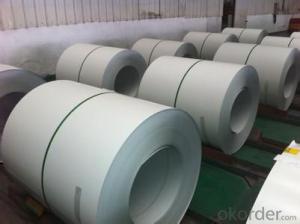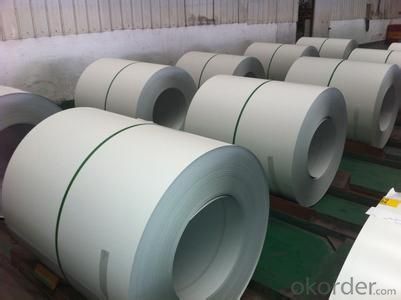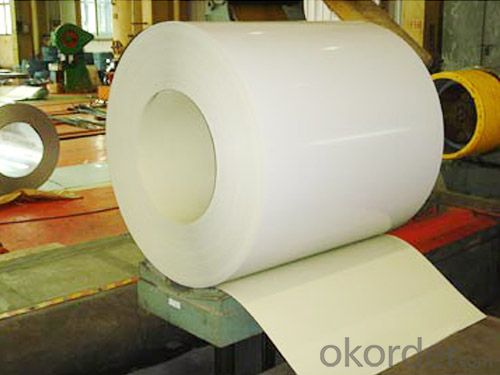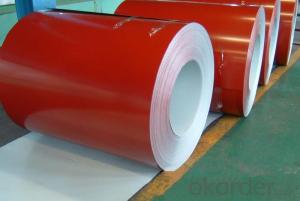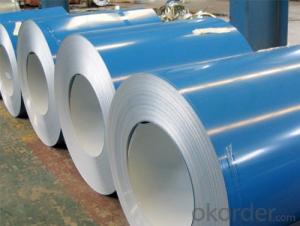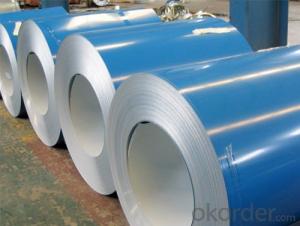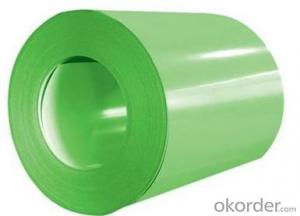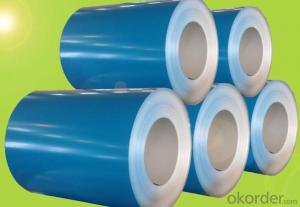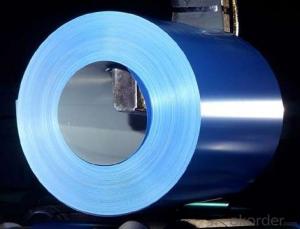Pre-painted Galvanized/Aluzinc Steel Sheet Coil with Prime Quality and Lowest Price
- Loading Port:
- Shanghai
- Payment Terms:
- TT OR LC
- Min Order Qty:
- 100 m.t.
- Supply Capability:
- 10000 m.t./month
OKorder Service Pledge
OKorder Financial Service
You Might Also Like
1.Structure of Pre-painted Galvanized/Aluzinc Steel Coil Description
With GI (aluzinc) as base metal, after pretreatment (degrease and chemical treatment) and liquid dope with several layers of color, then after firing and cooling, finally the plate steel is called pre-painted galvanized (aluzinc) steel.
2.Main Features of the Pre-painted Galvanized/Aluzinc Steel Coil
• Capability of decoration, molding, corrosion resistance
• Workability, durability
• Excellent heat resistance performance
• High strength
• Good formability
• Good visual effect
3.Pre-painted Galvanized/Aluzinc Steel Coil Images
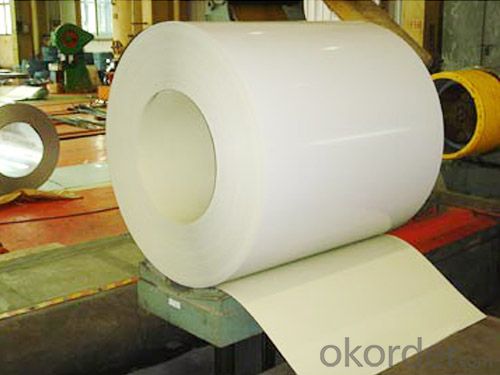
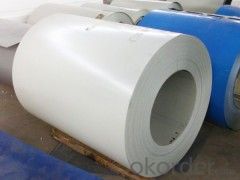
4.Pre-painted Galvanized/Aluzinc Steel Coil Specification
Thickness : 0.14-1.20 mm
Width : 914mm, 1000mm, 1220mm and 1250mm, thickness 600-1250mm is available
Quality standar: JIS G3312 CGCC & CGLCC
Hardness of P: Both soft and hard quality are available
Surface finish: with or without protect film
Finish by coil or sheet: Both sheet and coil are available
8Zinc coating: 60-275G/M2, both sides
Paint thickness for top side : 5 micron primer + (10-20) microns modified polyester, any RAL color code.
Paint thickness for back side: (5-10) microns Epoxy
Weight per coil: 4-6 tons, also can be upon customer's requirements.
Max loading weight in one 20ft container : 25 tons generally
5. FAQ of Pre-painted Galvanized/Aluzinc Steel Coil
We have organized several common questions for our clients,may help you sincerely:
1. What is the minimum order quantity ?
Our MOQ is 50mt for each size. And we will consider to give more discount if you make big order like 1000 tons and more. Further more, the more appropriate payment term your offer the better price we can provide.
2. How long can we receive the product after purchase?
Usually within thirty working days after receiving buyer’s advance payment or LC. We will arrange the factory manufacturing as soon as possible. The cargo readiness usually takes 15-25 days, but the shipment will depend on the vessel situation.
- Q: - I'm considering doing my physics coursework on the uses of Mild Steel in skyscrapers and construction, would this be right? Some sources tell me mild steel is too weak, others say it is fine
- Mild steel doesn't really mean anything, technically. In today's world all steel is mild steel unless it's high carbon or alloy, which are mostly tool steels. You'll need to study steel much deeper than that to accomplish any real physics work relating to steel.
- Q: I am looking for a steel taper kit to help me start stretching my earlobes. I wanted something like the following but in steel instead of acrylic. Preferably something under $40 and from a reputable website. I don't know how much damage acrylic tapers can do in the few seconds it would be inside my earlobe, but I would rather use steel just to be safe. I will be forever grateful if anyone can help.
- All okorder /... This is the cheapest stainless steel taper kit i could fine. You can also use titanium and glass, but never use acrylic tapers because they're cheap, toxic and will give your ears that really nasty smell as you get into bigger gauges. I hoped i helped.
- Q: How are steel coils used in the manufacturing of structural components?
- Steel coils are used in the manufacturing of structural components as they are typically used to form and shape various structural elements such as beams, columns, and trusses. These coils are unwound, flattened, and then processed through a series of machinery to be cut, shaped, and welded into the desired structural component. The steel coils provide a reliable and strong material base for the manufacturing process, ensuring the durability and stability of the final structural components.
- Q: How are steel coils used in the production of metal containers?
- Due to their versatility and strength, steel coils find wide application in the production of metal containers. Each stage of manufacturing metal containers relies heavily on steel coils. To begin with, steel coils serve as the primary raw material for metal container production. These coils consist of high-quality steel that is rolled into a continuous sheet, ensuring consistent thickness and durability. Subsequently, this sheet is cut into specific widths and lengths according to the container size requirements. Once the desired dimensions are achieved, various techniques are employed to shape the steel coils into container form. Roll forming, for example, is a commonly used method where the steel coil passes through a series of roll dies that gradually shape it into the desired container shape. This technique allows for the creation of containers in different sizes and designs, ranging from cans and drums to large industrial containers. After the initial forming process, the steel coils undergo further processing to enhance their strength and durability. Heat treatment is one such process where the coils are exposed to high temperatures to increase their hardness and resistance to wear and tear. Additionally, annealing and quenching methods may be employed to improve the steel's properties. Once the containers are formed and processed, additional fabrication steps, such as welding or sealing, are carried out to ensure their structural integrity. Steel coils are frequently utilized in these processes as they provide a robust and dependable material for creating sturdy seams and joints. Finally, metal containers receive various coatings or treatments to protect them from rust, corrosion, and other environmental factors. Steel coils can be coated with materials like paint, epoxy, or zinc to enhance their resistance to these elements, ultimately ensuring the longevity of the containers. In conclusion, steel coils play a crucial role in the production of metal containers. They serve as the primary raw material, aid in forming, processing, and finishing, and provide the necessary strength, durability, and versatility required for manufacturing reliable metal containers across a range of industries.
- Q: What are the different grades of steel used for making coils?
- The different grades of steel used for making coils vary depending on the specific application and requirements. Common grades include low carbon steel (e.g., ASTM A36), medium carbon steel (e.g., ASTM A572), high carbon steel (e.g., ASTM A516), and stainless steel (e.g., AISI 304). Each grade offers different properties such as strength, ductility, corrosion resistance, and heat resistance, allowing manufacturers to choose the most suitable grade for their coil production needs.
- Q: I bought a Remington 870 super mag last fall and wanted to to switch to non-tox steel loads. The gun came with a modified rem choke. I know that not all chokes are qualified to handle steel. It doesn't say anywhere on the choke no steel I was just wondering if anyone out there knew for sure that those chokes that the guns come with won't get damaged be steel.
- No problem. With steel shot you would use one choke size LARGER. If you want a full choke type pattern ( 70 % in a 30 inch circle at 30 yards ) you use a modified choke. if you want a modified pattern use the improved cylinder. Don't use the full or extra full. This is because when using lead shot it deforms, and fits through the choke, steel shot does not deform, it remains rigid. The first indication of a problem will be a slight bulge in the barrel right behind the choke. Check that once in a while, if you ever have that problem, it is not drastic if caught early. Today's modern shotguns all have been set up for steel shot. The old ones such as Belgium Brownings, are a no go. Funny thing, when we first began importing steel shot, I asked a Browning Tech guy if he thought I could fire steel out of my Belgium Browning. He said not a good idea, however, if you have the Citori or other Japanese made Brownings, no problem. Hummm, my expensive Brownings, no, but Japanese made OK, this is because the Japanese steel was higher quality. Geeeze. I was shocked.
- Q: How are steel coils inspected for color consistency?
- Steel coils are inspected for color consistency using a variety of methods to ensure that the final product meets the desired specifications. One common method is visual inspection, where trained inspectors examine the steel coils under controlled lighting conditions to detect any variations in color. This is done by comparing the color of each coil to a standard color chart or a previously approved sample. Any discrepancies are noted and further analysis is conducted. Additionally, advanced technologies such as spectrophotometers may be employed to measure the color of the steel coils objectively. Spectrophotometers use light to measure the reflective properties of the steel surface, allowing precise color analysis. The obtained color data is then compared to the specified color range, and any deviations are flagged for further investigation. Furthermore, some manufacturers may use automated color measurement systems, such as colorimeters or color cameras, to inspect steel coils for color consistency. These systems can quickly and accurately assess the color of each coil, ensuring uniformity across the entire batch. Overall, the inspection of steel coils for color consistency involves a combination of visual inspection, spectrophotometry, and automated color measurement systems. This comprehensive approach helps to guarantee that the steel coils meet the required color standards, providing consistent and high-quality products to customers.
- Q: Why is the steel tape tape head not fixed?
- There are better tape measures, heads and magnets. For measuring steel objects, one can operate long distances.
- Q: What are the benefits of using steel coils in the manufacturing of pipes?
- There are several benefits of using steel coils in the manufacturing of pipes. Firstly, steel coils offer high strength and durability, making them capable of withstanding extreme pressure and temperature conditions. This ensures the longevity and reliability of the pipes. Secondly, steel coils provide excellent corrosion resistance, which is crucial for pipes that come into contact with different substances or are used in corrosive environments. Additionally, steel coils allow for seamless production and fabrication of pipes, resulting in a smooth surface finish and uniform dimensions. Lastly, steel coils are readily available and cost-effective, making them a preferred choice for pipe manufacturing.
- Q: Can steel coils be coated with barcodes?
- Yes, steel coils can be coated with barcodes. Barcodes can be printed or attached onto the surface of steel coils, allowing for easy identification, tracking, and inventory management.
Send your message to us
Pre-painted Galvanized/Aluzinc Steel Sheet Coil with Prime Quality and Lowest Price
- Loading Port:
- Shanghai
- Payment Terms:
- TT OR LC
- Min Order Qty:
- 100 m.t.
- Supply Capability:
- 10000 m.t./month
OKorder Service Pledge
OKorder Financial Service
Similar products
Hot products
Hot Searches
Related keywords
